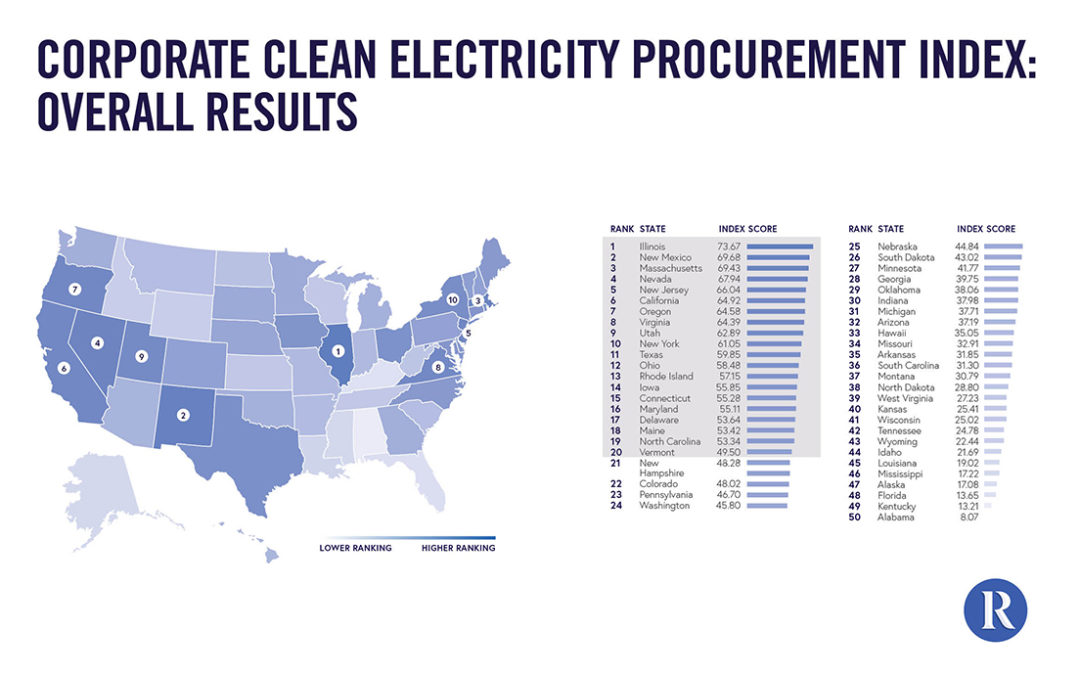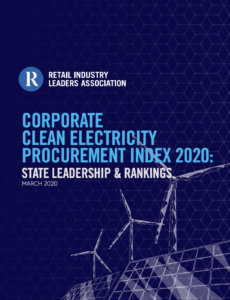The Retail Industry Leaders Association (RILA) has released the 2020 update to the Corporate Clean Energy Procurement Index. This groundbreaking study, first undertaken in 2017, shows how some states have improved their rankings by enacting common sense policies regarding domestic clean energy production and therefore are more likely to attract new business development, creating thousands of jobs in their communities.
The updated analysis released today by RILA ranks all 50 U.S. states based on the ease with which America’s most recognizable brands can procure state-level renewable energy for their operations.
“I am pleased to see Illinois’ high ranking in terms of renewable energy procurement policies,” said Ann Williams, Chair of the Illinois House Energy & Environment committee. “A partnership with business is critical for us to achieve our clean energy goals, including the reduction of carbon emissions, investment in renewable energy resources and energy efficiency and the growth of our green economy.”
The Corporate Clean Energy Procurement Index: 2020 State Leadership & Rankings notes that More than 22 GW of corporate renewable energy deals have been announced in the U.S. since 2008, with over 13.5 GW of purchases announced in 2018 and 2019 alone, according to the Renewable Energy Buyers Alliance (REBA). Retail and tech companies such as Amazon, Apple, Facebook, Google, Microsoft, Target and Wal-Mart are among nearly half of the Fortune 500 companies seeking to locate operations in states with access to clean energy production due to cost effectiveness, fossil fuel price volatility and pollution concerns. The index is intended to inform business leaders and guide state policymakers hoping to attract new job-creating businesses and foster economic growth.
“With stores in every community across the U.S. and a growing commitment to clean energy, leading retailers are driving the demand for renewables in a profound way,” said Austen Jensen, Senior Vice President at the Retail Industry Leaders Association. “This report shows that states that respond to this demand with competitive energy markets will attract more business, and in turn, more jobs and economic growth.”
In addition to ranking all 50 states, the report provides examples of states that have successfully removed policy barriers that inhibit states from growing their economies through domestic renewable energy. These barriers include a lack of access to renewable energy from third-party developers, viable procurement options from local utilities, and an inability to develop projects onsite at corporate facilities.
The results show a wide disparity in clean energy policy at the state level, making some states far more attractive to businesses that use large amounts of electricity. The Index also looks at these issues regionally to highlight how states compare with their neighbors and to provide examples for how states can develop and implement policies that encourage more corporate renewable generation.
“This report confirms that when we create open, fair markets that allow renewables to compete, top corporations increasingly choose low-cost solar energy,” said Abigail Ross Hopper, president and CEO of the Solar Energy Industries Association (SEIA). “Companies are deploying on- and off-site solar at an impressive clip. This index will help businesses make smarter decisions about where to locate their projects while signaling to states with less solar friendly policies that they have work to do if they want to jumpstart local solar energy and draw corporate investment.”
The report recommends that state policymakers focus on providing companies access to economic onsite, offsite, and utility procurement options which enable greater customer choice of renewable energy and competition from renewable energy producers. It urges states to remove policy barriers that target their domestic clean energy producers and inhibit economic development. To back up its findings, the report also includes examples of where these barriers remain.

